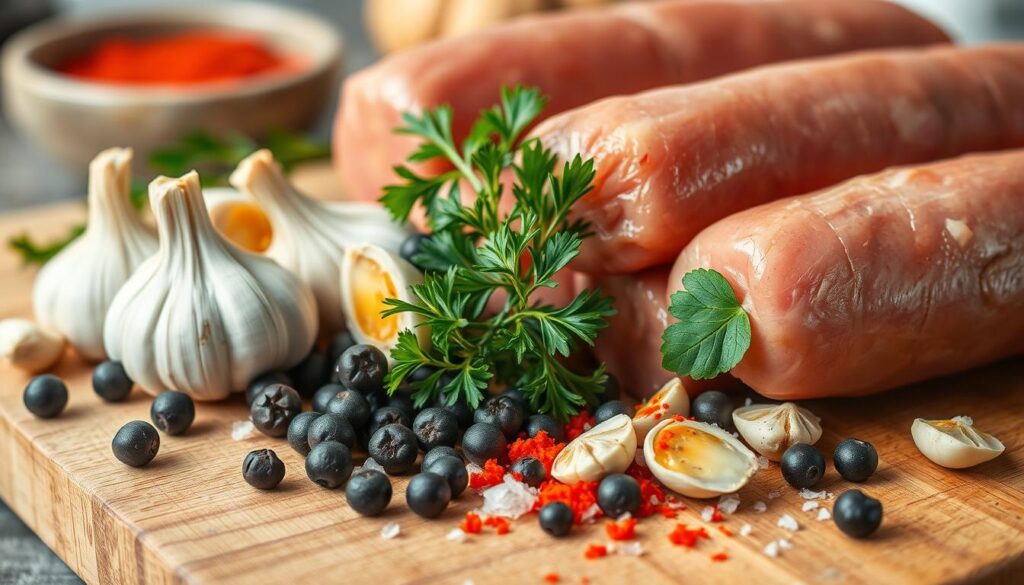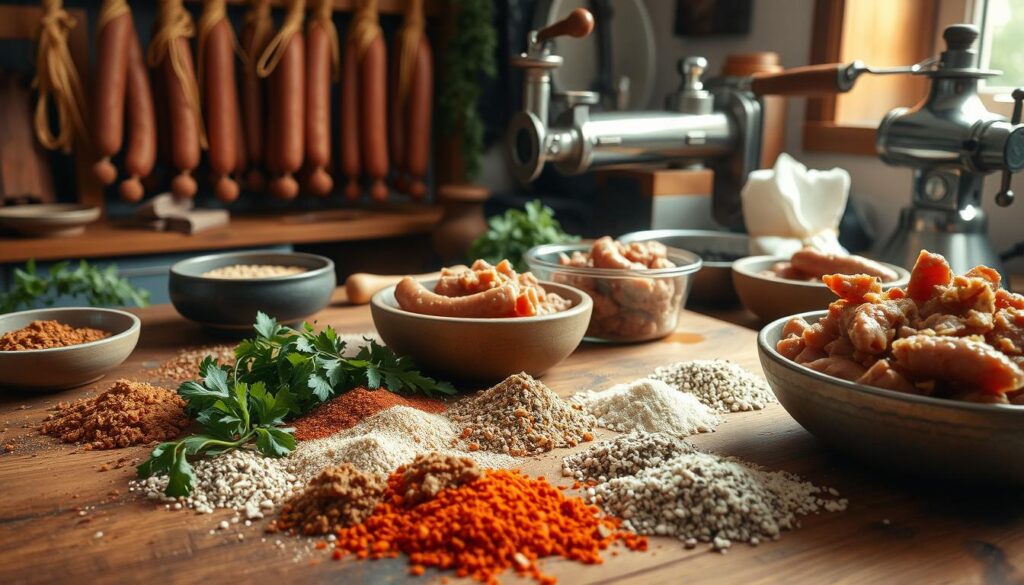Growing up in a Polish-American home, the smell of kielbasa filled the air. It brought back memories of family times and the flavors of my heritage. The smell of garlic, marjoram, and smoky char was like a warm hug.
As I looked at the many sausages in stores, I wondered what made kielbasa special. Let’s uncover what makes this Polish treat stand out.
Table of Contents
Understanding Kielbasa: A Polish Culinary Heritage
Origins and Cultural Significance
Kielbasa, the famous Polish sausage, has its roots in the 14th century. It’s a key part of Polish celebrations, like Easter and Christmas. Making kielbasa was a family affair, with recipes changing by region and family.
Kielbasa is a symbol of Poland’s rich food traditions. It’s known for its smoky taste and thick texture.
Traditional Role in Polish Cuisine
Kielbasa is a big deal in Polish food, appearing in dishes like “żurek” and “bigos” at holidays. These sausages are great grilled or with cabbage or sauerkraut. They show how versatile kielbasa can be.
The recipe for kielbasa includes pork, pepper, salt, marjoram, and garlic. Some recipes also add beef. Smoking it for up to a day and a half makes it even tastier.
“A popular tradition in Poland involves roasting kielbasa over a campfire, similar to cooking marshmallows, contributing to its enjoyment and flavor.”
Kielbasa’s importance goes beyond food. It’s protected by the European Union. This means only Polish-made kielbasa can be called Polish Kielbasa. It keeps the sausage’s true taste and heritage alive.
The Meaning Behind the Name: Kielbasa vs Polish Sausage
In Poland, “kielbasa” means any sausage. But in the U.S., it usually means a smoked pork sausage. This sausage is a big part of Polish cuisine.
In the U.S., “kielbasa” and “Polish sausage” often mean the same thing. This is a smoked pork sausage that’s very popular. It’s seasoned with garlic, salt, and pepper.
Poland has many different sausages. They use meats like pork, beef, and turkey. Each area in Poland has its own special sausage.
| Type of Polish Sausage | Description |
|---|---|
| Polish Smoked Sausage (Polska Kiełbasa Wędzona) | Cured using sodium nitrite, ground, stuffed into natural hog casings, and hardwood smoked. |
| Polish Fresh Sausage (Kiełbasa Biała Surowa) | Not cured, smoked, or cooked; used in making Easter soup called Zurek. |
| Polish Turkey Kielbasa | A popular variety made with turkey meat. |
| Polish Ham Kielbasa | A type of kielbasa made with ham. |
| Polish Beer Sausage | A kielbasa variety flavored with beer. |
| Polish Kielbasa Krakowska | A kielbasa specialty from the Krakow region. |
| Polish Kielbasa Weselna (Wedding Sausage) | A festive kielbasa variety often served at weddings. |
In the U.S., you can find kielbasa and Polish sausage in many places. Grocery stores and specialty markets carry it. It’s also a big part of regional dishes like Chicago’s Maxwell Street Polish.
How is Kielbasa Different from Sausage?
Kielbasa, a favorite Polish sausage, is different from regular sausages in many ways. It has a coarser, denser texture than most sausages. This is due to a special preparation method.
Distinct Characteristics and Preparation Methods
Kielbasa is made from a mix of pork, sometimes beef or other meats. The meat is ground coarsely and then cured, smoked, and dried. This gives it a rich, woodsy flavor.
Unique Seasoning and Spice Blends
Kielbasa’s seasoning is also special. It’s seasoned with garlic, pepper, and marjoram. This mix gives it a bold, intense taste.
Texture and Consistency Differences
The coarse grind and smoking make kielbasa denser and chewier. It also has visible meat pieces, unlike finely ground sausages.
These differences make kielbasa unique. Its rich flavor and texture set it apart from other sausages.
| Characteristic | Kielbasa | Regular Sausage |
|---|---|---|
| Texture | Coarse, denser | Finely ground, softer |
| Seasoning | Garlic, pepper, marjoram | Varies by region and recipe |
| Preparation | Coarsely ground, smoked | Finely ground, may be cured or fresh |
| Appearance | Visible meat pieces, U-shaped | Uniform, link-style |
Traditional Ingredients and Composition
The kielbasa, a traditional Polish sausage, gets its unique taste from a mix of meats and spices. Pork is the main ingredient, sometimes mixed with beef or turkey. This mix creates a rich flavor.
Garlic is key in almost every kielbasa recipe. Other spices include salt, pepper, marjoram, paprika, and sometimes mustard seed. The spice mix can change based on the region and recipe.
| Nutritional Information (per 3 oz serving) | Typical Kielbasa | Grass-fed Kielbasa |
|---|---|---|
| Calories | 337 | 286 |
| Fat (g) | 25 | N/A |
| Carbohydrates (g) | 4 | N/A |
| Sodium (mg) | 903 | N/A |
| Vitamin B12 (% DV) | 26% | N/A |
| Niacin (% DV) | 20% | N/A |
| Selenium (% DV) | 14% | N/A |
In the U.S., kielbasa is mostly pork sausage, often pre-smoked. It comes in two main types: a “U” shaped sausage or a single link. You can enjoy it with grilled onions, pickles, and mustard, or in dishes like bigos.

Types of Kielbasa: A Comprehensive Guide
Kielbasa, the beloved Polish sausage, comes in many varieties. Each has its own special taste and history. This guide will take you through the different types of kielbasa that have won hearts around the world.
Smoked Varieties
The most famous kielbasa outside Poland is the smoked kind. It’s made from pork and is fully cooked. These sausages have a deep, smoky taste and a firm texture. They’re great for charcuterie boards, grilling, and many other dishes.
Fresh Varieties
Fresh kielbasa, or “biała kielbasa,” is a raw sausage that needs to be cooked. These sausages are often boiled or grilled. They have a juicy inside and a light flavor.
Regional Specialties
Kielbasa also has many regional specialties. For example, Krakowska has a coarse texture and a peppery taste. Kiełbasa Wiejska is a mix of pork and beef with marjoram and garlic. These offer a taste of Poland’s rich culinary heritage.
If you’re looking for a healthier option, try Pastured Kielbasa. It’s made from animals raised on open pastures without antibiotics or hormones. It’s a great choice for those who want meat that’s good for them and the planet.
| Kielbasa Variety | Key Characteristics | Ingredients |
|---|---|---|
| Smoked Kielbasa | Deep, smoky flavor and firm texture | Pork, sometimes mixed with beef |
| Fresh Kielbasa (Biała Kielbasa) | Juicy interior and delicate flavor | Pork, requires cooking before consumption |
| Krakowska | Coarse texture and peppery flavor | Pork, seasoned with garlic and pepper |
| Kiełbasa Wiejska (Farmer’s Sausage) | Mix of pork and beef, seasoned with marjoram and garlic | Pork, beef, marjoram, garlic |
| Pastured Kielbasa | Ethically sourced and nutritionally superior | Pork, raised on open pastures without antibiotics or hormones |
The Art of Making Kielbasa
Making kielbasa, or Polish sausage, is a true art form. It’s made mainly from pork and is known for its smoky taste and strong flavors. Every step in sausage making and meat processing helps make this charcuterie a delight.
The journey starts with picking the right meat. Kielbasa uses a mix of pork and pork fat, usually 80% pork and 20% fat. The meat is ground to the right texture for the final product.
- The seasoning blend is key, with garlic, salt, pepper, and spices like marjoram or paprika. These are mixed into the meat to give it the Polish taste.
- The seasoned meat is stuffed into natural casings, often from pig intestines, or synthetic ones.
- For smoked kielbasa, the sausages are smoked in a smokehouse. They’re smoked with woods like hickory, maple, or cherry. This gives them their smoky flavor and helps preserve them.
Some kielbasa is sold fresh and needs to be cooked. Others are pre-cooked during smoking, so they’re ready to eat. The art of sausage making and meat processing makes kielbasa special as a charcuterie treat.

“The true essence of kielbasa lies in the perfect balance of pork, spices, and the patient, meticulous process of smoking. It’s a culinary tradition that has been passed down through generations, and the results are nothing short of extraordinary.”
Smoking Process and Techniques
The smoking process is key for smoked sausage like kielbasa. It boosts flavor and keeps the meat fresh. Sausages are exposed to smoke from burning wood like hickory, maple, or cherry.
Traditional Smoking Methods
In the old days, kielbasa was hung in a smokehouse. Smoke from wood fires filled the sausage, giving it a rich taste and smell. Smoking took one to one and a half days, making sure the meat was perfectly processed.
Modern Production Techniques
Today, charcuterie uses new ways to smoke. Modern chambers control temperature and smoke levels. This makes the sausage taste the same every time. Some use liquid smoke for big batches, keeping flavors consistent.
Choosing the right wood and smoking time is crucial. Trying different woods and times can create many flavors for kielbasa.
“The smoking process is the heart and soul of a great kielbasa. It’s where the magic happens, transforming a simple sausage into a culinary masterpiece.”
Nutritional Profile and Health Considerations
The nutritional value of kielbasa can change based on the type and ingredients. Traditional Polish sausage or cured meat kielbasa is high in protein. But, it can also have a lot of fat and sodium. Healthier options like grass-fed kielbasa have less fat and more omega-3 fatty acids.
Turkey kielbasa is a good choice for those who want less fat. It’s important to watch how much kielbasa you eat because it has a lot of calories. Also, some kielbasa may have preservatives, so always check the labels, especially if you have dietary restrictions.
It’s best to eat kielbasa in moderation. It can add flavor to your meals, but make sure to eat other foods too. This way, you can enjoy kielbasa while keeping your diet balanced and healthy.


9 thoughts on “How Is Kielbasa Different from Sausage?”